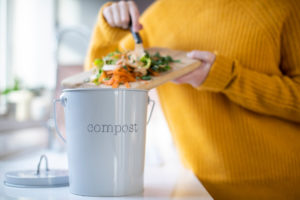 Composting is an appropriate way to reduce waste and make your own organic fertilizer. Moreover, it’s effortless to do with just a few simple tools. You can still compost your food waste, even if you’re renting a Troy apartment or home. At the same time, though, there are some things you must know at the outset. This basic guide will give an overview of the practice of composting and the steps you can take to get going with composting your food scraps.
Composting is an appropriate way to reduce waste and make your own organic fertilizer. Moreover, it’s effortless to do with just a few simple tools. You can still compost your food waste, even if you’re renting a Troy apartment or home. At the same time, though, there are some things you must know at the outset. This basic guide will give an overview of the practice of composting and the steps you can take to get going with composting your food scraps.
What is composting?
Composting is the method of breaking down organic matter, such as food scraps and yard waste, into a nutrient-rich soil amendment. The end product, presented as compost, can be used to increase the quality of your garden soil. Composting is indeed a great way to reduce waste, save money on fertilizer, and help the environment.
What can be composted?
Nearly any organic material can be composted, although some items break down more swiftly than others. Food scraps, for instance, fruits and vegetables, coffee grounds, and eggshells are all fine candidates for composting. Yard waste, for example, leaves, grass clippings, and twigs can equally be composted.
How to start composting
If you’re prepared to engage in composting, here are the steps you can take:
- Find a location for your compost bin. This can be a great spot for your container if you have a small balcony or patio. Just ensure it’s in a sunny location so the ingredients will break down effortlessly.
- Choose your ideal type of bin. There are various compost bins available, so research to search for the one that best suits your needs. Certain containers are planned for indoor use, though others are appropriate for outdoor spaces.
- Gather your compostable materials. Almost all kitchen scraps can be composted, including fruit and vegetable peels, coffee grounds, and eggshells. You can, on top of that, add yard waste similar to leaves and grass clippings to your bin.
- Add water to the bin on demand. The ingredients in your bin need to be moist to break down sufficiently, so make it a point to add water if the bin starts to look dry.
- Turn the contents of the bin as often as you can. This will help oxygenate the materials and hasten the composting process.
- Immediately, when the compost is ready, it should be dark and crumbly. It can then be added to your garden or used as mulch around your plants.
How to use compost
Compost can be used in many ways. Here are some ideas:
- Find a use for it as a soil amendment in a garden or planter. Compost can be mixed into the soil to increase drainage and aeration. It can equally help retain moisture and add nutrients to the soil.
- Use it as mulch. Spread a layer of compost around your plants to help manage weeds and retain moisture.
- Use it as a fertilizer. Compost can be used to fertilize your plants. Completely mix it into the soil around the base of the plant.
- Use it to choose a potting mix. Compost can be joined with other ingredients, including perlite or vermiculite, to set up a potting mix for your indoor plants.
- Use it to create compost tea. This liquid fertilizer can be made by steeping compost in water for several days. It can then be put to use to fertilize your plants or to water seedlings.
Composting is an excellent way to diminish your environmental impact and help your garden or houseplants thrive. By observing these convenient tips, you can rapidly compost at home, even if you’re renting.
Are you in the market for a new rental home – probably one with more outdoor space for composting and acting on your green thumb? In such a case, talk to one of our Troy property managers today or view our listings online.
We are pledged to the letter and spirit of U.S. policy for the achievement of equal housing opportunity throughout the Nation. See Equal Housing Opportunity Statement for more information.


